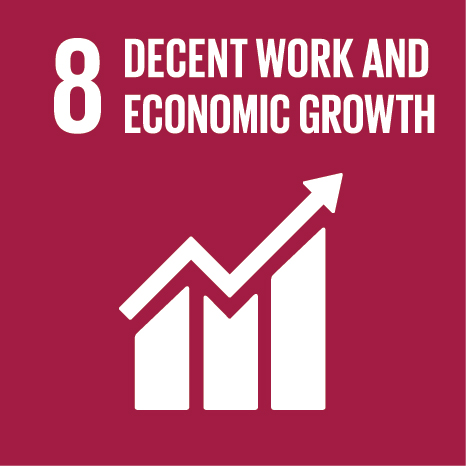 Sustained and inclusive economic growth can drive progress, create decent jobs for all and improve living standards.
Sustained and inclusive economic growth can drive progress, create decent jobs for all and improve living standards.
COVID-19 has disrupted billions of lives and endangered the global economy. The International Monetary Fund (IMF) expects a global recession as bad as or worse than in 2009. As job losses escalate, the International Labor Organization estimates that nearly half of the global workforce is at risk of losing their livelihoods.
Even before the outbreak of COVID-19, one in five countries – home to billions of people living in poverty – were likely to see per capita incomes stagnate or decline in 2020. Now, the economic and financial shocks associated with COVID-19—such as disruptions to industrial production, falling commodity prices, financial market volatility, and rising insecurity—are derailing the already tepid economic growth and compounding heightened risks from other factors.
Facts and Figures
- Multiple crises are placing the global economy under serious threat. Global real GDP per capita growth is forecast to slow down in 2023. Challenging economic conditions are pushing more workers into informal employment.
- As economies start to recover, the global unemployment rate has experienced a significant decline. However, the youth unemployment rate continues to be much higher than the rate for adults, indicating ongoing challenges in securing employment opportunities for young people.
- The pandemic has accelerated digital adoption and transformed access to finance. Globally, 76 per cent of adults had bank accounts or accounts with regulated institutions in 2021, up from 62 per cent in 2014.
- Achieving Goal 8 will require a wholesale reform of the financial system to tackle rising debts, economic uncertainty and trade tensions, while promoting equitable pay and decent work for young people.
- The slowdown in global growth in 2023 is likely to be less severe than previously expected, mainly due to resilient household spending in the developed economies and recovery in China. Global economic growth is now projected to reach 2.3 per cent in 2023, an upward revision by 0.4 percentage points from the January forecast. World Economic Situation and Prospects as of mid-2023 Key messages
- Average global inflation is projected to decline from 7.5 per cent in 2022 to 5.2 per cent in 2023 amid lower food and energy prices and softening demand especially in the large developed economies. World Economic Situation and Prospects as of mid-2023 Key messages
- The World Economic Situation and Prospects (WESP) report projects world output growth to decelerate to 1.9% in 2023 – a drop of more than a percentage point from 3% in 2022. Tepid Economic Growth Threatens SDGs, Warns UN Flagship Report | News | SDG Knowledge Hub | IISD
Targets
- 8.1 Sustain per capita economic growth in accordance with national circumstances and, in particular, at least 7 per cent gross domestic product growth per annum in the least developed countries
- 8.2 Achieve higher levels of economic productivity through diversification, technological upgrading and innovation, including through a focus on high-value added and labour-intensive sectors
- 8.3 Promote development-oriented policies that support productive activities, decent job creation, entrepreneurship, creativity and innovation, and encourage the formalization and growth of micro-, small- and medium-sized enterprises, including through access to financial services
- 8.4 Improve progressively, through 2030, global resource efficiency in consumption and production and endeavour to decouple economic growth from environmental degradation, in accordance with the 10-year framework of programmes on sustainable consumption and production, with developed countries taking the lead
- 8.5 By 2030, achieve full and productive employment and decent work for all women and men, including for young people and persons with disabilities, and equal pay for work of equal value
- 8.6 By 2020, substantially reduce the proportion of youth not in employment, education or training
- 8.7 Take immediate and effective measures to eradicate forced labour, end modern slavery and human trafficking and secure the prohibition and elimination of the worst forms of child labour, including recruitment and use of child soldiers, and by 2025 end child labour in all its forms
- 8.8 Protect labour rights and promote safe and secure working environments for all workers, including migrant workers, in particular women migrants, and those in precarious employment
- 8.9 By 2030, devise and implement policies to promote sustainable tourism that creates jobs and promotes local culture and products
- 8.10 Strengthen the capacity of domestic financial institutions to encourage and expand access to banking, insurance and financial services for all
- 8.A Increase Aid for Trade support for developing countries, in particular least developed countries, including through the Enhanced Integrated Framework for Trade-Related Technical Assistance to Least Developed Countries
-
8.B By 2020, develop and operationalize a global strategy for youth employment and implement the Global Jobs Pact of the International Labour Organization






